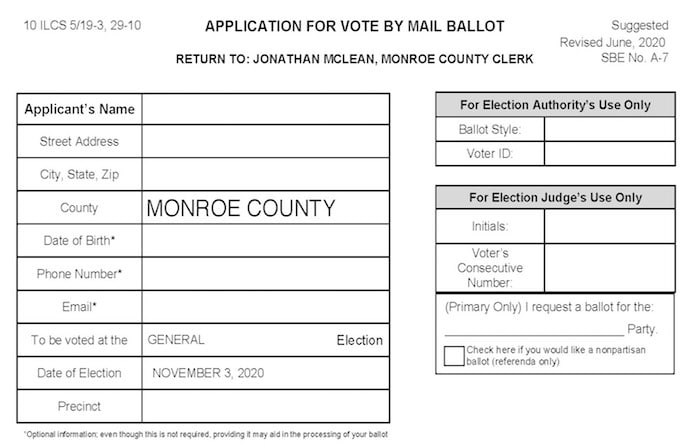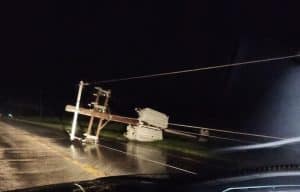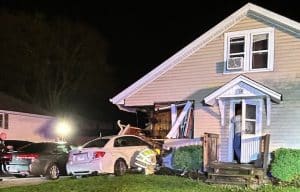Clerk confident in vote by mail

By now, Monroe County voters should have received a letter from Monroe County Clerk Jonathan McLean with instructions on how to vote by mail ahead of the November election.
Illinois law required all county clerks to send a letter to anyone who voted at least once in the last three elections outlining the vote by mail process as the state looks to ensure people concerned about safety due to the COVID-19 pandemic can vote.
McLean, a Republican who spoke against the expansion of vote by mail earlier this year, said there is a misconception about what vote by mail means because it is the same as absentee voting in Illinois.
“When people hear ‘vote by mail,’ they incorrectly perceive it to be universal vote by mail, which is where everyone gets a ballot,” McLean explained. “That’s not what this is. In Illinois, we call it vote by mail, but really it’s the same as absentee.”
The process to vote by mail begins with a voter filling out an application that includes basic information like name and address.
An application and blank return envelope were included with the letter McLean’s office sent, and one is available online at monroecountyil.gov/departments/county-clerk-and-recording.
Those wishing to vote by mail must sign it and send it to the county clerk via mail or by emailing a scanned PDF of the application to jmclean@monroecountyil.gov.
Voters must return their applications by Oct. 26, though they can hand-deliver them to the county clerk’s office up until the day before the election.
The county clerk’s office then enters applicant information into its computer system and starts sending ballots to those who requested them as early as 45 days before the election.
The ballots will be the same as those people use when voting in person.
Voters must then return their ballots using the provided envelope with postage paid or by dropping them off in person up until the day before the election.
McLean said he prefers people send in their ballots as soon as possible to make tallying votes easier, but the actual deadline is later.
“As long as they get them in the mail, and they are postmarked by election day, then we’re good,” he said.
Concerns of voter fraud often fuel the debate over expansion of vote by mail, and McLean explained several steps being taken to help prevent any illegal voting.
One method the entire state is using is only sending ballots to those who voted in recent elections.
“A lot of the fraud is eliminated because we’re not mailing ballots to people who didn’t ask for them,” McLean told the Republic-Times.
McLean’s office is also implementing several measures the state does not require but some municipalities have put in place, such as a signature check.
By requiring voters to sign their application, the county clerk’s office can check the signature against the one it has on file from when individuals register to vote.
“We make sure that the signature on the application matches the signature on the signature card,” McLean stressed. “We just want to make sure it’s not a case of a parent or someone else in the household signing someone else’s name.”
The county clerk’s office also checks the address on the application with the official address that person has on file with the secretary of state’s office.
If the signature does not match or there is a discrepancy between the address, the county clerk’s office will contact the voter to determine why there is an issue.
For example, a voter’s signature may have changed or they may be temporarily living somewhere else.
“We don’t think we’re really going to have any problems here,” McLean said of voter fraud. “Those two are really good (protections).”
Additionally, McLean said his office is updating its voter registration information with Illinois Department of Public Health Records death records daily and has a system to ensure people who vote early at the county clerk’s office cannot also vote at their polling place.
“I think we’ve thought of pretty much everything,” McLean said. “I’m sure there will be some things that are out of our control, but we’re doing our best to make sure people have confidence in the election and to prevent accidents from happening.”
In addition to voter fraud, McLean addressed other potential problems with expanded vote by mail.
For example, he said in a typical election his office might receive 1,500 applications to vote by mail. This year, he is expecting as many as 8,000 applications.
While there are always a few people who do not send ballots back, McLean said he anticipates most will be returned because November’s election is a presidential election.
That increased volume leads to more work for the county clerk’s office, which is part of why McLean asked voters to send their ballots back quickly.
“It’s a whirlwind right now,” McLean said. “Our office is overwhelmed. This is a big change, and we’re also trying to deal with the health and safety of our staff.”
The county clerk’s office has already had to close once because a member of the staff tested positive for COVID-19.
Adding to time concerns is the fact the United States Postal Service’s revenue has decreased during the pandemic and Postmaster General Louis DeJoy has enacted various cost-cutting measures.
The combination of those factors has led to significant mail delays in parts of the country.
McLean said he has spoken to the Waterloo postmaster and the mail processing center in St. Louis about the matter.
All ballots will have a logo on the envelope showing they are election mail, and postal employees are being trained to give those items special attention and care.
To help voters have confidence their vote is counted, McLean said he is working with a company to put a tracking number on the envelopes to allow people to track their individual ballots – similar to how packages bought from an online retailer can be tracked.
“That does not track how you voted,” McLean emphasized. “It only tracks the envelope as it comes back to the courthouse.”
Similarly, McLean is working to have a system at the courthouse that will allow voters to confirm their ballots have been tabulated.
McLean also stressed that people can drop ballots off at the Monroe County Courthouse.
“We’re trying to do everything we can to give everyone confidence this is secure,” McLean said. “Be patient with us.”
A final issue of the expansion of vote by mail is the cost.
McLean said it will cost about an extra $75,000 for all of these efforts, but that will be offset by a $75,000 grant from Illinois through the Coronavirus Aid, Relief and Economic Security Act.
Even with all the concerns, McLean predicted the election here will go smooth.
“I think we’re going to be pretty good,” he assessed. “As long as we don’t have any technical issues, we should have results on election night.”






